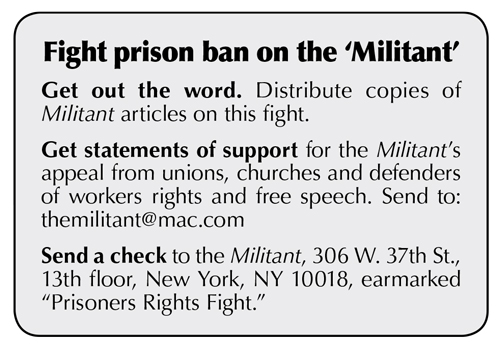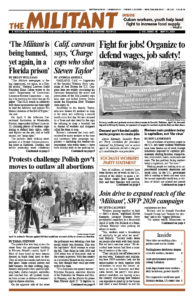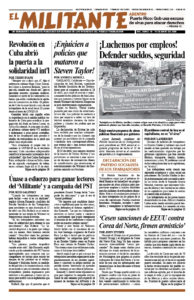“The Militant newspaper is being suppressed, yet again, in a Florida prison,” National Lawyers Guild President Elena Cohen wrote to the state’s Department of Corrections Literature Review Committee — urging it to overturn the latest ban on the paper. “The NLG stands in solidarity with those incarcerated and their right to read the Militant, and against this blatant violation of the Bill of Rights,” she said.
On April 6 the Jefferson Correctional Institution in Monticello, Florida, impounded Militant issue no. 13, claiming photos of workers organizing to defend their rights, safety and dignity on the job, and to build unions, are “gang signs.”
The pictures show striking meatpackers at a Perdue chicken processing plant in Kathleen, Georgia, and nurses protesting work conditions outside a medical facility in Richmond, California, raising their fists in the air — a well-known expression of determination and pride in the justice of their fight.
Also cited is a photo of United Steelworkers Local 8888 members during their successful fight to organize a union at the Newport News, Virginia, shipyard in 1979, a strike that registered the strengthening of the working class as a result of the fight for Black rights in the South.
This is the first time in eight months that the Militant has been impounded by Florida prison authorities, after years of skirmishes over numerous issues. Most of these were reversed on appeal after organizations and individuals who backed the rights of the Militant, and of prisoners to read what they want, wrote letters protesting the bans.
In response to the latest blatant attack on rights, the Literature Review Committee has been getting letters protesting the banning. “We urge the Committee to reverse the impoundment at its next meeting and permit Florida prisoners to receive these issues of the Militant,” wrote Benjamin Stevenson for the American Civil Liberties Union of Florida April 23. Objecting to workers “holding a fist in the air,” he said, “appears to be a pretext to prohibit current concerns about safety and health.”
Stevenson added, “We urge the Committee to comply with the constitution.”
When authorities seize a copy of the Militant at any Florida prison, the issue is removed from all 48 subscribers in prisons across that state, and countless others who read the paper as it’s passed around.
“Officials from Florida DOC institutions have repeatedly attempted to censor issues of this publication over the past three years,” wrote Justin Mazzola, deputy director of research for Amnesty International USA, April 23. He urged prison authorities to overturn the impoundment and “cease the arbitrary impoundment of the publication by Florida DOC institutions in the future.”
“The act of informing subscribers about events of the outside world in and of itself should not be means to violate prisoners’ freedom of expression,” he wrote.
The Militant ’s attorney, David Goldstein, is preparing the paper’s appeal and Literature Review Committee officials say they will take it up at its next meeting, scheduled for the first week of May.
“We will fight to reverse this,” said Militant editor John Studer, “as we have done in every instance where officials ban an issue of the Militant from workers behind bars.
“We’re fighting to defend our right to have subscribers behind bars and for the right of prisoners to read material of their choosing,” Studer said. “The reason prison officials give for barring the Militant is clearly spurious. The Militant is being banned for positively portraying working-class struggles.”
Studer urged readers of the paper to get statements from co-workers, unions, churches and defenders of political rights calling for ending the impoundment. They should be sent to Literature Review Committee, Attn: Dean Peterson, 501 South Calhoun St., Tallahassee, FL 32399-2500. Email: Allen.Peterson@fdc.myflorida.com. Send copy to themilitant@mac.com.

